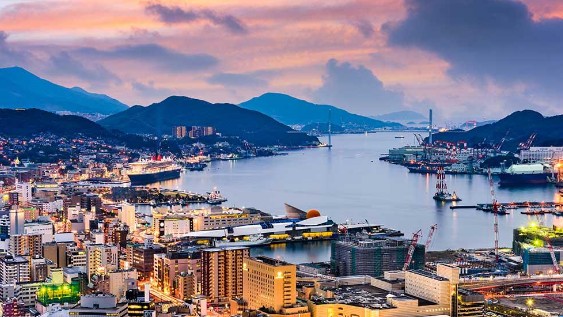Trip of the week: a Japanese city opens to the world again
Nagasaki, on the relatively lush and balmy island of Kyushu, has been almost entirely rebuilt since 1945

A free daily email with the biggest news stories of the day – and the best features from TheWeek.com
You are now subscribed
Your newsletter sign-up was successful
Nagasaki was the only part of Japan open to outsiders for centuries during the early modern age, says Jamie Lafferty in The Times. Almost entirely rebuilt after the War, it sits on a great natural harbour near the country’s southwestern tip, surrounded by forested mountains, on the relatively lush and balmy island of Kyushu.
It is a long way from Japan’s main tourist attractions, but Nagasaki is easy enough to include in a broader tour of the country, which is slowly reopening to tourists following the pandemic.
The memory of the atomic bomb that exploded over the city on 9 August 1945 is ever-present for visitors and residents alike. The Atomic Bomb Museum focuses on the “minutiae” of that terrible day, with “profound” testimony from witnesses; and the Nagasaki Peace Park is intended for “contemplation and mourning”.
The Week
Escape your echo chamber. Get the facts behind the news, plus analysis from multiple perspectives.

Sign up for The Week's Free Newsletters
From our morning news briefing to a weekly Good News Newsletter, get the best of The Week delivered directly to your inbox.
From our morning news briefing to a weekly Good News Newsletter, get the best of The Week delivered directly to your inbox.
But the city that rose from the ashes is a vibrant place nonetheless, and there’s much else to learn about its history. Nagasaki’s first major encounter with outsiders ended badly, with the crucifixion of 26 Portuguese missionaries in the late 16th century. But while foreigners were banned from the rest of Japan until 1875, Nagasaki remained open to Dutch and Chinese traders. The houses in which they lived in the Dejima district have been reconstructed in great detail, and feature a unique mixture of Japanese architecture and foreign furniture.
The city’s cuisine is a fascinating mix of Japanese and foreign influences. Indeed, its quintessential dessert, a sponge cake called Castella, was introduced by the unfortunate Portuguese five centuries ago. And there’s much to see nearby, including the abandoned mining island of Hashima, which will be familiar to some as the villain’s lair in the 2012 Bond film Skyfall. With its mangled postwar architecture, it is a weird and otherworldly place.
Inside Japan has a 13-night tour, including Nagasaki, from £2,660pp, excluding flights
A free daily email with the biggest news stories of the day – and the best features from TheWeek.com
-
 6 of the world’s most accessible destinations
6 of the world’s most accessible destinationsThe Week Recommends Experience all of Berlin, Singapore and Sydney
-
 How the FCC’s ‘equal time’ rule works
How the FCC’s ‘equal time’ rule worksIn the Spotlight The law is at the heart of the Colbert-CBS conflict
-
 What is the endgame in the DHS shutdown?
What is the endgame in the DHS shutdown?Today’s Big Question Democrats want to rein in ICE’s immigration crackdown
-
 Bad Bunny’s Super Bowl: A win for unity
Bad Bunny’s Super Bowl: A win for unityFeature The global superstar's halftime show was a celebration for everyone to enjoy
-
 Book reviews: ‘Bonfire of the Murdochs’ and ‘The Typewriter and the Guillotine’
Book reviews: ‘Bonfire of the Murdochs’ and ‘The Typewriter and the Guillotine’Feature New insights into the Murdoch family’s turmoil and a renowned journalist’s time in pre-World War II Paris
-
 6 exquisite homes with vast acreage
6 exquisite homes with vast acreageFeature Featuring an off-the-grid contemporary home in New Mexico and lakefront farmhouse in Massachusetts
-
 Film reviews: ‘Wuthering Heights,’ ‘Good Luck, Have Fun, Don’t Die,’ and ‘Sirat’
Film reviews: ‘Wuthering Heights,’ ‘Good Luck, Have Fun, Don’t Die,’ and ‘Sirat’Feature An inconvenient love torments a would-be couple, a gonzo time traveler seeks to save humanity from AI, and a father’s desperate search goes deeply sideways
-
 A thrilling foodie city in northern Japan
A thrilling foodie city in northern JapanThe Week Recommends The food scene here is ‘unspoilt’ and ‘fun’
-
 Tourangelle-style pork with prunes recipe
Tourangelle-style pork with prunes recipeThe Week Recommends This traditional, rustic dish is a French classic
-
 Samurai: a ‘blockbuster’ display of Japan’s legendary warriors
Samurai: a ‘blockbuster’ display of Japan’s legendary warriorsThe Week Recommends British Museum show offers a ‘scintillating journey’ through ‘a world of gore, power and artistic beauty’
-
 BMW iX3: a ‘revolution’ for the German car brand
BMW iX3: a ‘revolution’ for the German car brandThe Week Recommends The electric SUV promises a ‘great balance between ride comfort and driving fun’